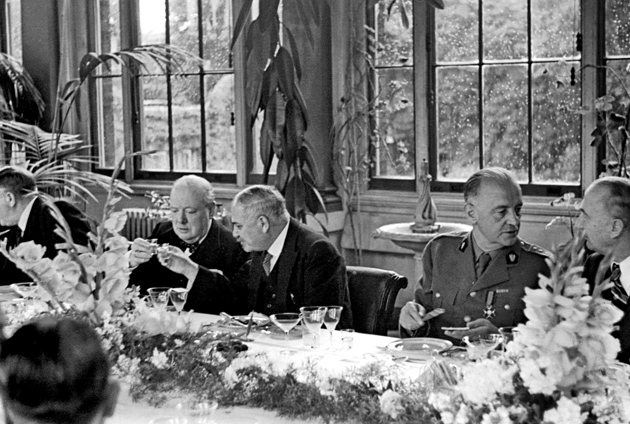Stalin’s terror and purges of the 1930s discouraged high Soviet officials from putting a pen to paper let alone keeping personal records and above all diaries. The following excerpts are taken from the rare and unique diary assiduously kept by Ivan Maisky, the Soviet ambassador to London between 1932 and 1943. The diary, which contains close to 1,600 pages of dense handwritten and typed entries, minutely and candidly records his observations, conversations, and activities while in London.
A former Menshevik with Jewish ancestors, Maisky survived the terror until two weeks before Stalin’s death on March 5, 1953. At the height of the anticosmopolitan campaign he was arrested and charged with espionage, treason, and involvement in Zionist conspiracy and sentenced to six years in prison. Following his arrest, his private papers and diary were confiscated and deposited at the archives of the Russian Foreign Ministry, where I found them. Released in 1955 and cleared of all charges, he died in 1975.
Maisky was born in 1884. His early revolutionary activities led in 1902 to his expulsion from St. Petersburg University and exile first to Siberia and then to London, where he spent the years between 1912 and 1917. There he established close relations with the future commissars for foreign affairs, Georgii Chicherin and Maxim Litvinov. It was during his years in exile that Maisky mastered the English language, as well as British history and culture, and established a wide circle of friends from political, intellectual, and literary circles, among them George Bernard Shaw, H.G. Wells, and Beatrice Webb. His command of foreign languages, and his familiarity with the international scene, bolstered by his friendship with Litvinov, accounted for his swift rise in the Soviet diplomatic service after the revolution. Following short stretches in junior positions in London, Tokyo, and Helsinki, he returned to London as an ambassador in late 1932.
Maisky wrote his highly personal diary with an eye for posterity. He recorded conversations with five British prime ministers, including Ramsay MacDonald, Lloyd George, Stanley Baldwin, Neville Chamberlain, and Winston Churchill, as well as with other prominent British political figures such as Lord Halifax, Anthony Eden, Lord Beaverbrook, and John Maynard Keynes. The diary bears witness to the drift toward war throughout the 1930s, including the appeasement at Munich, the negotiations culminating in the Ribbentrop-Molotov Pact, Churchill’s rise to power, the Battle of Britain, and the events leading to the wartime alliance following Hitler’s invasion of Russia in June 1941.
—Gabriel Gorodetsky
12 March 1937
On 4 March all heads of diplomatic missions submitted their credentials to the new king, George VI. The procedure was simplified and carried out en masse. All the ambassadors and envoys were lined up in order of seniority in the Bow Room of Buckingham Palace. They were admitted one by one to the neighboring room, where the King was expecting them, submitted their credentials to him, exchanged a few remarks as demanded by protocol, and left, giving way to those still waiting. The King devoted two or three minutes to each diplomat. [Anthony] Eden was present at the ceremony and gave some assistance, as the King is taciturn and easily embarrassed. He also stammers. The entire ceremony went smoothly. The only shock, which caused quite a stir in the press and in society, was [Joachim von] Ribbentrop’s “Nazi salute.” When the German ambassador entered the room to meet the King, he raised his right hand in greeting, rather than making the usual bow. This “novelty” offended the English deeply and triggered an adverse reaction in conservative circles. Ribbentrop was accused of tactlessness and was compared with me—a “good boy” who greets the King properly, without raising a clenched fist above his head.
To meet the diplomats’ wives, the King and Queen also gave a five o’clock tea party today, inviting the heads of missions and their spouses. Ribbentrop again saluted the King with a raised hand, but he bowed to the Queen in the normal manner. The little princesses were also present: Elizabeth and Margaret Rose, both wearing light pink dresses and, it was clear, terribly excited to be present at such an “important” ceremony. But they were also curious in a childish way about everything around them. They shifted from one foot to the other, then they began to giggle, and then to misbehave, to the considerable embarrassment of the Queen. Lord Cromer1 led my wife and me to the royal couple and we had quite a long chat—I with the King and Agniya with the Queen. The ladies were for the most part discussing children, whereas the King inquired about the state of our navy and the White Sea–Baltic Canal. The King expressed great satisfaction when I informed him that the battleship Marat would arrive for the coronation.
16 November 1937
Today Agniya and I attended the “state banquet” given by George VI in honor of King Leopold of Belgium, who has arrived on a four-day visit. It was a banquet like any other. One hundred eighty guests, the entire royal family, members of government, ambassadors (but not envoys), and various British notables. We ate from gold plates with gold forks and knives. The dinner, unlike most English dinners, was tasty (the King is said to have a French cook). Two dozen Scottish “pipers” entered the hall during the dinner and slowly walked around the tables several times, filling the palace vaults with their semibarbarian music.
Advertisement
I like this music. There is something of Scotland’s mountains and woods in it, of the distance of bygone centuries, of man’s primordial past. Pipers’ music has always had a strange, exciting effect on me, drawing me off somewhere far away, to broad fields and boundless steppes where there are neither people nor animals and where one feels oneself young and brave. But I saw that the music was not to the tastes of many guests. They found it rough, sharp, and indecently loud in the atmosphere of palatial solemnity and refinement. Leopold was one of the dissatisfied diners….
After two speeches made by George VI and Leopold, who proclaimed unbreakable friendship between their states, the guests moved to the adjacent halls and we, the ambassadors, were gathered in the so-called Bow Room where the two kings, ministers, and some high-ranking courtiers were located. The ladies were in a neighboring hall with the young and old queens. Here, once again, everything was as it always is at “state banquets”: first the kings talked between themselves while the ambassadors propped up the walls like expensive “diplomatic furniture.” Then Lord Cromer and other courtiers began buzzing among the guests and leading the “lucky few,” who were to be favored with the “very highest attention,” to one or the other of the kings. Leopold conversed with Chamberlain, Hoare, Montagu Norman (governor of the Bank of England), and, from among the ambassadors, with Grandi, Ribbentrop, and Corbin.2 There was an obvious orientation toward the “aggressor” and the aggressor’s collaborator.
Naturally enough, I was not so honored: the USSR is out of fashion today, especially in the upper echelons of the Conservative Party. The Japanese ambassador Yoshida, who skulked in a corner, was not invited to pay his respects either. No wonder: Japanese guns are currently firing on British capital and British prestige in China!…
I eventually tired of this dull spectacle and I was already planning to slip out to the other rooms, where I could see many interesting people I knew. But at that moment there was a sudden commotion in the Bow Room. I looked up and realized what was happening. Lord Cromer, emerging from a neighboring room, led Churchill to Leopold and introduced him. George soon joined them. The three of them carried on a lively and lengthy conversation, in which Churchill gesticulated forcefully and the kings laughed out loud. Then the audience ended. Churchill moved away from the kings and bumped into Ribbentrop. Ribbentrop struck up conversation with the famous “German-eater.” A group immediately formed around them. I did not hear what they were talking about but I could see from a distance that Ribbentrop was, as usual, gloomily pontificating about something and that Churchill was joking in reply, eliciting bursts of laughter from the people standing around.
Finally Churchill seemed to get bored, turned around, and saw me. Then the following happened: in full view of the gathering and in the presence of the two kings, Churchill crossed the hall, came up to me, and shook me firmly by the hand. Then we entered into an animated and extended conversation, in the middle of which King George walked up to us and made a comment to Churchill. The impression was created that George, troubled by Churchill’s inexplicable proximity to the “Bolshevik ambassador,” had decided to rescue him from the “Moscow devil.” I stepped aside and waited to see what would happen next. Churchill finished his conversation with George and returned to me to continue our interrupted conversation. The gilded aristocrats around us were well-nigh shocked….
17 August 1940
The Duke of Windsor has arrived with his Mrs. Simpson in the Bahamas, where he has been appointed governor. Essentially, of course, this is exile. Why has the former king been treated so harshly?
I’ve heard from excellent sources that Queen Elizabeth is behind it all. She is “master” of the house and has the King under her thumb. She is awfully jealous. She has set herself the task of bringing popularity and splendor to the royal family. She sends the King everywhere—to camps, factories, the troops, the front line—so that he should appear everywhere, so that people should see him and grow used to him. She never rests either: bazaars, hospitals, telephone operators, farmers, etc.—she visits them all, gives her blessing, graces with her presence, parades. She even pulled off the following, highly unusual stunt recently. The Queen’s brother…arranged a private tea party to which a dozen prominent American journalists were invited. The Queen attended the party too, and for 1½ hours she “chatted graciously” to the correspondents, together and individually. But not, of course, for the papers. The Queen is terribly afraid that the Duke of Windsor might return home and “steal” his brother’s popularity, which required so much effort to achieve. That is why the Duke of Windsor was exiled to the Bahamas.
Advertisement
—Translated by Dr. Oliver Ready and Tatiana Sorokina
Copyright © 2011 by Gabriel Gorodetsky
This Issue
April 28, 2011




